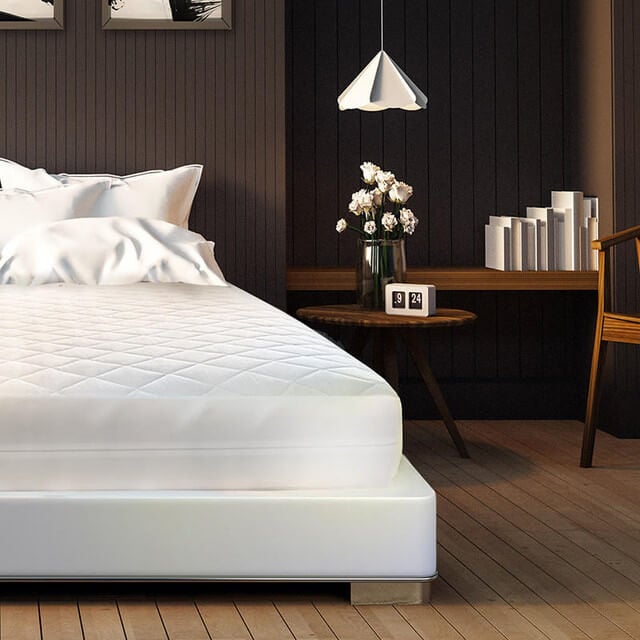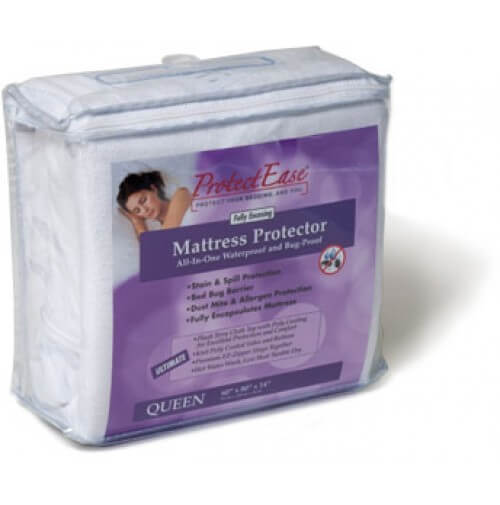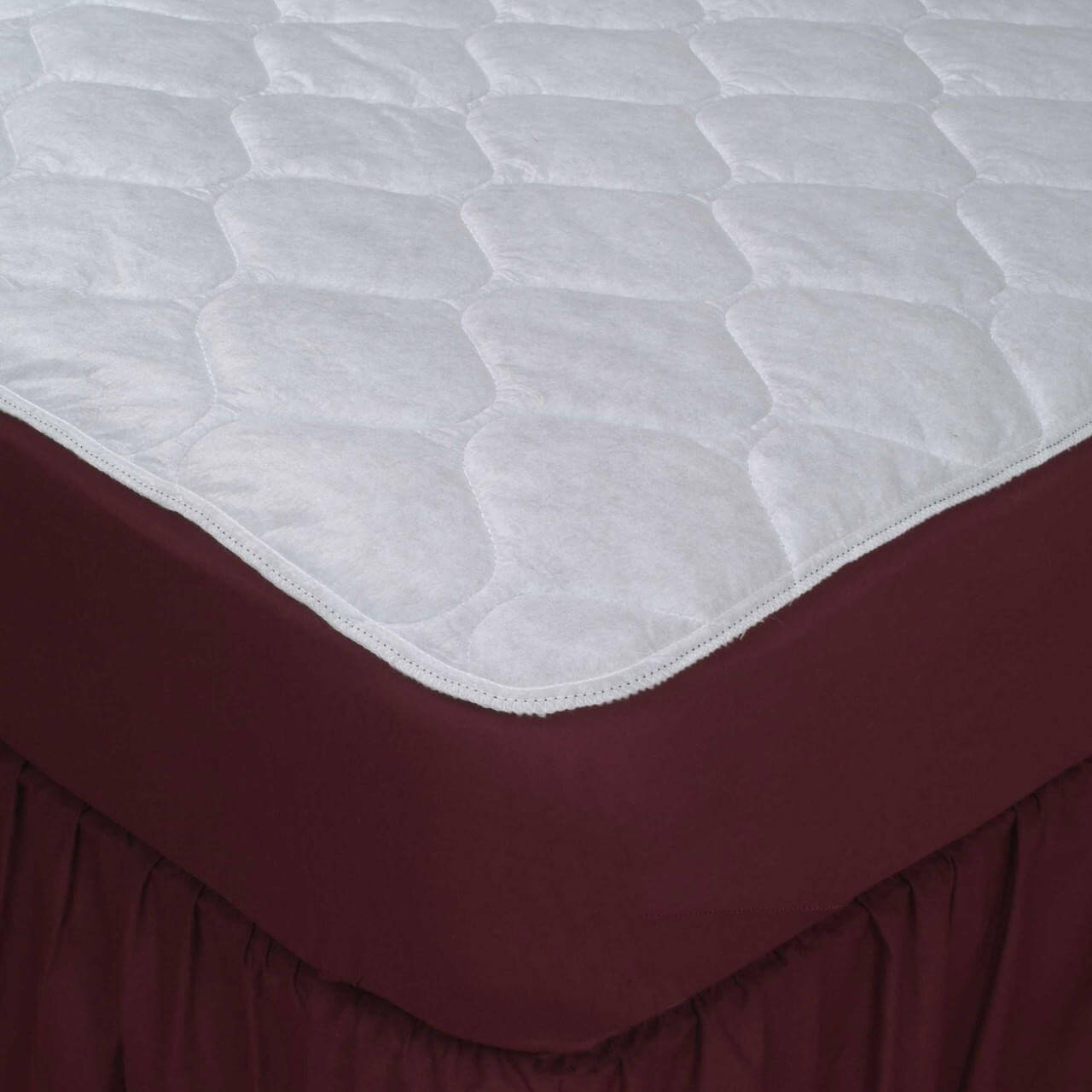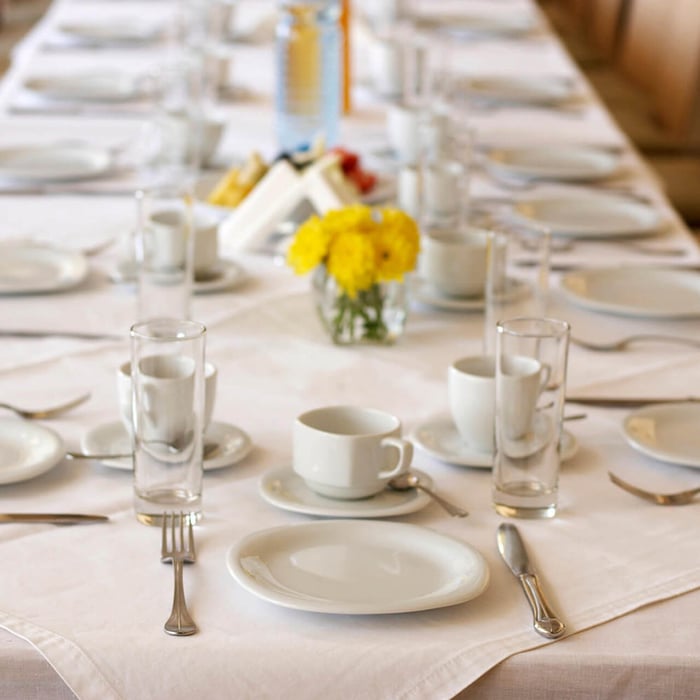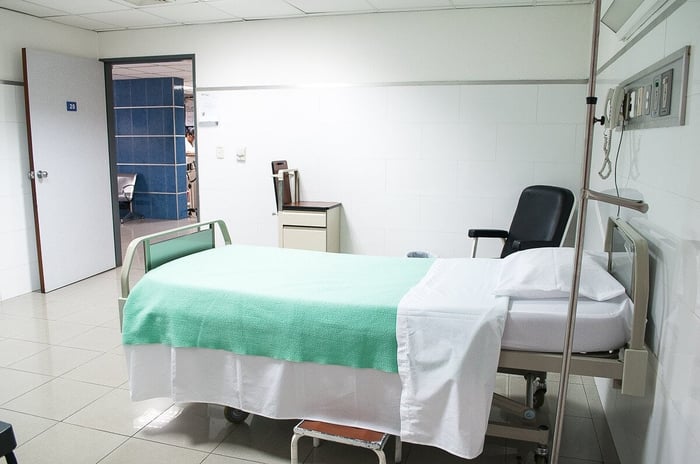Nothing says good night's sleep like a comfy mattress, but what you may not know is that to make sure your mattress last longer and stay in pristine condition, it needs a little extra protection. The best mattress can be ruined by accidents, spills, dust mites, allergens, and other factors that can damage its surface and affect its longevity. This is where a mattress protector comes in handy. In this guide we'll walk you through the ins and outs of buying a mattress protector.
From thread count and waterproofing to knowing when it’s time for a new one, this buying guide covers all you need to know about extending the life of your bed. So get ready for some expert tips on how best to shop for the perfect mattress protector.
Choosing the right mattress protector can be a daunting task, with so many different types, sizes, materials, and features to consider. In this comprehensive guide, we'll walk you through all the key factors you need to know when buying a mattress protector. Whether you're looking for a waterproof, dust mite-proof, allergen-proof, or breathable mattress protector, we've got you covered. By the end of this guide, you'll have all the information you need to make an informed purchase and protect your investment in your mattress.
KEY TAKEAWAYS
There are several types of mattress protectors, including waterproof, fitted, and encasement protectors.
It is important to choose a mattress protector that is the correct size and fits your mattress snugly.
Materials commonly used in mattress protectors include cotton, polyester, bamboo, microfiber, and vinyl.
The thickness and comfort of a mattress protector will depend on the materials used and your personal preferences.
Look for a mattress protector that is durable and easy to maintain.
Price and warranty are important factors to consider when choosing a mattress protector.
A mattress protector can extend the life of your mattress and improve the quality of your sleep.
What is the purpose of a mattress protector?
Let's start with the purpose, simply put, it provides an additional layer of protection for your mattress. A mattress protector can help prevent damage to your mattress from spills, stains, dust, and allergens, as well as protect against wear and tear over time. By using a mattress protector, you can help extend the lifespan of your mattress and keep it in good condition for longer. Additionally, some mattress protectors may also provide added comfort and temperature regulation, as well as noise reduction for a more restful sleep experience.
Types of mattress protectors
There are several types of mattress protectors available on the market today, each designed to serve a specific purpose. Here are the most common types of mattress protectors:
Waterproof Mattress Protectors
Waterproof mattress protectors are designed to protect your mattress from spills, stains, and other types of liquid damage. They are usually made of a waterproof material such as vinyl or polyurethane, which creates a barrier between the mattress and any liquid that may come in contact with it. Waterproof mattress protectors are especially useful for young children or anyone who suffers from incontinence.
Dust Mite-Proof Mattress Protectors
As the name suggests, these are designed to protect your mattress from dust mites, which are tiny creatures that can cause allergies and asthma. These protectors are made of a tightly woven fabric that prevents dust mites from entering the mattress. They are especially useful for people who suffer from allergies or asthma.
Allergen-Proof Mattress Protectors
Similar to dust mite-proof protectors however these are designed to protect against a wider range of allergens, including pet dander, pollen, and mold. These protectors are also made of tightly woven fabrics that create a barrier against allergens.
Breathable Mattress Protectors
Breathable mattress protectors are designed to allow air to circulate through the mattress, keeping it cool and comfortable. They are usually made of natural materials such as cotton or bamboo, which are breathable and moisture-wicking. Breathable mattress protectors are ideal for hot sleepers or anyone who wants to stay cool and comfortable throughout the night.
When choosing a mattress protector, it's important to consider your specific needs and choose the type that best suits them. For example, if you have allergies or asthma, an allergen-proof or dust mite-proof mattress protector may be the best choice for you. If you have young children or are prone to spills, a waterproof mattress protector may be a better option.
What is the difference between a bed pad and a mattress protector?
Although both a bed or mattress pad and a mattress protector can provide additional comfort and protection for your mattress, there are some key differences between the two:
1. Purpose: The primary purpose of a mattress protector is to provide a barrier between your body and the mattress to protect against spills, stains, dust, and allergens. A bed pad, on the other hand, is designed primarily for additional comfort, with some models offering features such as cooling or warming properties. Bed pads are popular in nursing homes and hospitals.
2. Material: Mattress protectors are typically made from materials that are waterproof or water-resistant, while mattress pads are made from materials such as cotton, polyester, or foam.
3. Thickness: Mattress protectors are generally thinner than mattress pads, as their primary purpose is to provide protection rather than additional cushioning.
4. Fit: Mattress protectors are designed to fit tightly over your mattress, while mattress pads may have more flexibility in their fit.
Why Size and Fit Matter
Choosing the right size and fit is important for several reasons. First, a protector that is too small will not provide adequate coverage and may not stay in place. On the other hand, a protector that is too large may bunch up or slip off the mattress, compromising its protection. In addition, choosing the right size and fit can help ensure maximum comfort and a better night's sleep.
Measure your mattress to size your mattress protector
You'll need to measure your mattress. Start by measuring the length, width, and depth of your mattress using a measuring tape.
Material
The material of your mattress protector can affect its durability, breathability, and comfort. Here are some of the most common materials used in mattress protectors:
Cotton
Cotton is a popular material for mattress protectors because it is soft, breathable, and durable. It is also a natural material, making it a good choice for people with allergies or sensitivities to synthetic materials. However, cotton is not waterproof, so it may not be the best choice for people who are prone to spills or accidents.
Polyester
Polyester is a synthetic material that is commonly used in mattress protectors. It is durable, moisture-wicking, and easy to care for. Polyester is often blended with other materials such as cotton or bamboo to improve its breathability and comfort. However, some people may have allergies or sensitivities to polyester, so it may not be the best choice for everyone.
Bamboo
Bamboo is a natural material that is becoming increasingly popular in mattress protectors. It is soft, breathable, and moisture-wicking, making it ideal for people who sleep hot or sweat at night. Bamboo is also naturally antimicrobial, making it a good choice for people who are prone to allergies or asthma. However, bamboo is not as durable as other materials and may not be as effective at protecting against spills or stains.
Vinyl or Polyurethane
Vinyl or polyurethane are synthetic materials that are used in waterproof mattress protectors. They are effective at protecting against spills and stains and are easy to clean. However, they are not breathable and may not be as comfortable as other materials. In addition, some people may have allergies or sensitivities to vinyl or polyurethane, so it may not be the best choice for everyone.
When choosing the material for your mattress protector, consider your specific needs and preferences. If you are looking for a natural material, cotton or bamboo may be the best choice for you. If you need a waterproof protector, vinyl or polyurethane may be the most effective. Ultimately, the material you choose will depend on your specific needs, preferences, and budget.
Thickness and Comfort
The thickness of your mattress protector can affect its durability, protection, and comfort. Thicker protectors may be more durable and provide better protection against spills and stains. However, they may also be less breathable and less comfortable than thinner protectors. Thinner protectors may be more breathable and comfortable, but may not provide as much protection.
The comfort of your mattress protector is also important for a good night's sleep. Look for a protector that is soft, smooth, and comfortable to the touch. Some protectors may have additional features such as cooling technology or extra padding for added comfort. Consider your specific needs and preferences when choosing a protector that will be comfortable for you.
Noise
Some mattress protectors may make noise when you move around in bed. This can be distracting and may interfere with your sleep. Look for protectors that are quiet and will not make noise as you move.
When choosing a mattress protector, consider both the thickness and comfort to ensure that you get a protector that will protect your mattress and provide a comfortable sleeping surface.
Durability and Maintenance
The durability and maintenance of your mattress protector can affect its longevity and effectiveness.
A durable mattress protector will last longer and provide better protection for your mattress. Look for protectors that are made from high-quality materials and are well-constructed. Thicker protectors may be more durable, but they may also be less breathable and less comfortable. Consider the overall quality of the protector and choose one that will withstand regular use and washing
Regular maintenance is important for keeping your mattress protector clean and effective. Look for protectors that are easy to clean and can be washed in the washing machine. Some protectors may have specific care instructions, so be sure to read the label carefully. Consider purchasing an extra protector so that you can easily switch it out while the other is being washed.
Warranty
A warranty can provide additional peace of mind and protect your investment. Look for protectors that come with a warranty, especially if you are investing in a higher-end or more expensive protector. Check the warranty period and any specific requirements or limitations.
What sizes do mattress protectors come in?
Mattress protectors come in a variety of sizes to fit different mattress sizes. The most common sizes of mattress protectors are:
- Twin: 39 inches x 75 inches
- Twin XL: 39 inches x 80 inches
- Full: 54 inches x 75 inches
- Queen: 60 inches x 80 inches
- King: 76 inches x 80 inches
- California King: 72 inches x 84 inches
Some mattress protectors may also come in specialty sizes to fit non-standard mattress sizes or to accommodate mattresses with additional depth. When shopping for a mattress protector, it's important to make sure that you choose the size that corresponds to your mattress size for the best fit and protection.
What is the best material for a mattress protector?
The best material for a mattress protector depends on your specific needs and preferences. Here are some common materials used in mattress protectors and their benefits:
1. Cotton: Cotton is a natural material that is soft, breathable, and comfortable. It is a good choice for people who want a soft and comfortable sleeping surface that is also hypoallergenic.
2. Polyester: Polyester is a synthetic material that is durable, lightweight, and easy to clean. It is often blended with other materials to create a mattress protector that is both comfortable and protective.
3. Bamboo: Bamboo is a natural material that is eco-friendly, soft, and breathable. It is also naturally hypoallergenic and moisture-wicking, making it a good choice for people with allergies or who tend to sleep hot.
4. Microfiber: Microfiber is a synthetic material that is soft, lightweight, and durable. It is often used in mattress protectors to provide a soft and comfortable sleeping surface while also protecting the mattress from spills and stains.
5. Vinyl: Vinyl is a synthetic material that is waterproof and often used in mattress protectors designed to protect against spills and bedwetting. It is not breathable, however, and may be uncomfortable for some people to sleep on.
When choosing a mattress protector, consider the level of protection you need, your personal preferences for comfort and breathability, and any allergies or sensitivities you may have.
How to wash a mattress protector?
The exact instructions for washing a mattress protector may vary depending on the specific product and manufacturer, so it's important to always check the care label for any specific washing instructions. However, here are some general steps to follow:
1. Remove the protector from your mattress and unzip any zippers or remove any fasteners.
2. Check the care label for any specific washing instructions. If the protector is machine washable, it can typically be washed on a gentle cycle in cold or warm water.
3. Use a mild detergent that is free of bleach, fabric softener, or other additives that could damage the protector or reduce its effectiveness.
4. Avoid using high heat or harsh drying methods, as these can damage the protector. Instead, air-dry the protector or use a low heat setting in the dryer.
5. Once the protector is dry, reattach any zippers or fasteners and put it back on your mattress.
It's also a good idea to wash your mattress protector regularly, at least every few months, to help keep it clean and extend its lifespan.
Where to buy mattress protectors?
Invest in a quality protective bedding to ensure optimal protection and comfort. Consider the size and fit, material, thickness and comfort, durability and maintenance of your mattress protector. Also think about how much you are willing to invest by considering the price and warranty of the product. Investing in a quality protector can help you enjoy a great night's sleep while extending the longevity of your mattress; look no further than Direct Textile Store for the perfect fit. By shopping at Direct Textile Store you'll get excellent customer service, top-notch products, along with a myriad of choices for your mattress protection needs - time to relinquish that old-school method of driving to a store to shop.
Direct Textile Store ships to all US states, including Alaska and Hawaii, US Territories, Canada, Puerto Rico, St. Thomas, and St. Croix.
About the Author
Haley Bridges, Marketing Assistant at Direct Textile Store
Haley Bridges has served as Marketing Assistant at Direct Textile Store, where she specializes in hospitality linens, uniforms, and bulk textile solutions. She works closely with hotels, restaurants, and healthcare facilities to match them with durable, high-quality products that balance both performance and value. Haley's expertise in textile sourcing and merchandising strategy helps businesses make confident purchasing decisions while staying ahead of industry trends.

